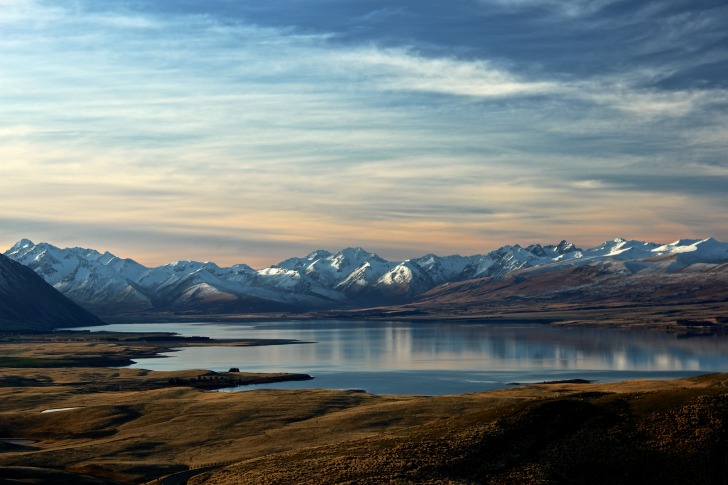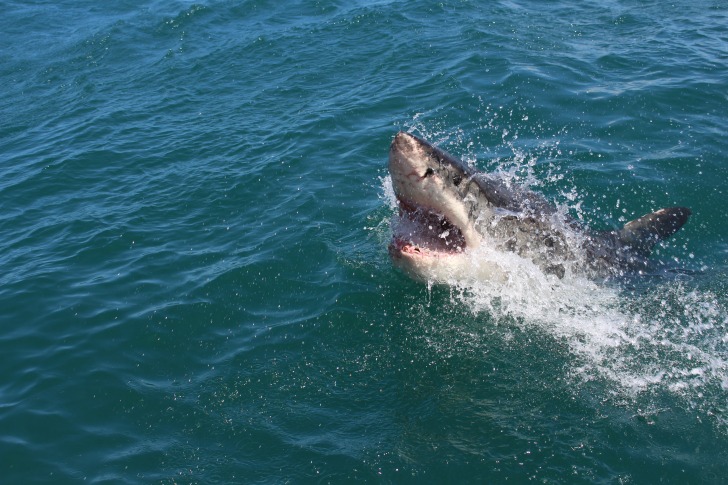There are numerous beautiful beaches that line the coasts of New Zealand, and that border the Tasman and the Pacific Oceans.
The island is home to a wide range of sea life including cetaceans, sea turtles, lions, seals, and plenty more.
The beaches offer loads of outdoor activities, such as a range of water sports, national parks, beautiful hiking trails, etc.
But there are many dangers that lurk just beneath the waters of the New Zealand ocean.
Contents
So… Are There Sharks in New Zealand
Yes, there are various apex predators swimming in the waters of New Zealand.
In fact, there isn’t a stretch of coastline where you won’t find some kind of shark activity in New Zealand.
There are an estimated 66 different shark species present in the waters around the island nation.
Of these different species, 12 are most commonly sighted by fishermen and swimmers on the coast.
Both the north and the south island are home to various shark species.
Many of the species found around New Zealand are harmless and will not pose a threat to humans.
However, there are certain species, such as the great white shark, that are considered to be extremely dangerous.
In fact, according to the Department of Conservation, New Zealand is considered to be a hotspot for great white shark activity, along with South Africa, California, Japan, and Australia.
Records from 1888 to date indicate that there have been a total of 31 shark attacks in New Zealand and nine of those attacks were fatal.
These are not alarmingly high numbers if you consider the number of tourists that the country sees annually and how many of those tourists venture to the beaches.
The summer months are more likely to see higher shark activity in and around New Zealand as the water temperature is closer to the ideal temperature for sharks.
The water in New Zealand during the summer is around 70.2°F, which closely resembles the 72°F that sharks prefer to swim in.
In addition to the water temperature, there is an abundance of food supply.
New Zealand is known to have a booming seal population.
Wherever there is a high number of seals or sea lions, you are sure to find sharks.
Many shark species eat seals and hunt them.
As such, swimmers are always advised to avoid water that has a lot of seals as there are sure to be sharks present.

Of the various shark species found in New Zealand, the following sharks are the most frequently encountered:
- Bronze whaler
- Spiny dogfish
- The great white shark
- Shortfin mako
- Rig shark
- School shark
- Blue shark
- Smooth hammerhead
- Basking whale
- Rig shark
- Goblin shark
Many of these sharks are harmless to humans and feed off various small fish, crustaceans, and other small fish species.
The biggest danger in these waters, the great white shark, is also the deadliest shark in the world.
The great white shark is known for the most attacks on humans in history, both provoked and unprovoked.
Two of the other dangerous sharks are the smooth hammerhead shark and the shortfin mako.
These sharks will not attack unless provoked, but they are known to attack humans.
Is it Safe to Swim in New Zealand?
Swimming is generally safe but swimmers need to be aware of the inherent dangers that are present in certain rivers, lakes, and other bodies of water.
The most prevalent danger in the ocean, for swimmers, is the threat that great white sharks present.
In addition, there are strong currents in the ocean and in some of the rivers as well.
Drowning is a very real possibility in many of the water bodies around the country.
Lakes present their own set of dangers.
Some lakes have borders, logs, debris, ledges, and rocks just beneath the surface which may cause serious harm to divers or swimmers who dive into the water from a height.
Always check a swimming spot thoroughly, at the start of each visit.
Floods play a major role in displacing rocks and debris at the bottom of river beds.
The fast-flowing waters during a flood are known to change the river banks.
An area that may have previously been clear of hazards may contain hazards after a flood.
In addition to these threats, is the threat of water quality. Some rivers and lakes may be polluted and thus unsafe to swim in.
It’s always best to check for advisory boards near the body of water to determine if the water is safe to swim in.
Interesting Shark Facts in New Zealand
There are a few interesting facts about sharks in New Zealand.
The great white shark, bull shark, hammerhead shark, and tiger shark are considered to be the deadliest sharks on the planet.
These sharks account for the most shark attacks on humans and the most fatal shark attacks.
The great white shark is present in the north and the south of New Zealand.
Adult great white sharks can be found in the south of the island, close to the food source: seals and sea lions.
While great white young sharks can be found in the warmer waters of the north, close to the shoreline.
This means that the most dangerous stretch of coastline in New Zealand is in the south, where most mature great white sharks reside.
Many of the shark species found in the waters of New Zealand are harmless to humans, such as the whale shark, the spiny dogfish shark, and the blue shark.
The sharks range in size from a small pygmy shark that grows to approximately just under ten inches in size to the much larger whale sharks that can grow to 40 feet in length and up to a ton in weight.
Two of the largest fish in the world, the basking shark and the whale shark, can be found in the waters of New Zealand.
Another potentially dangerous shark in these waters is the shortfin mako shark.
These sharks are only dangerous due to their size and speed in the water but will only attack when provoked.
Most encounters with sharks in New Zealand typically happen during summer and spring, when sharks move inshore to feed or give birth.
Sharks require salt in the water in order to live.
They need the salt in their bodies and get it from the ocean water.
Many sharks have not adapted to freshwater and cannot swim in it due to the lack of salt in the water.
If they are unable to retain the salt inside their bodies, they will bloat and die.
That’s because sharks lack a swim bladder.
This bladder is a gas-filled organ that allows them to stay afloat in the water.
Sharks tend to be less buoyant in freshwater due to not having a swim bladder.
Instead, they are large oil-filled livers that help to keep them buoyant in saltwater and to some extent in fresh water.
Some sharks have very large livers in order to be able to survive in freshwater.
One example of this is the bull shark.
They have exceptionally large livers and often travel up fresh and brackish water rivers.
Certain sharks have adapted to the point that they only live in freshwater and never venture into saltwater.
Sharks that live in the ocean are often saltier than the saltwater they live in.
They take the saltwater in through their gills and they filter out what they do not need.
The salt content in freshwater is too low for saltwater sharks.
River sharks or freshwater sharks, have lower salt content in their bodies and do not experience the same problems as freshwater sharks.

3 Safety Tips for Swiming in Shark-infested Waters
- Avoid swimming in shark-infested waters. The first and most obvious safety tip is to not go into waters that are known to have aggressive shark species inhabiting them. Don’t wander off too far from shore because it could be difficult to find your way back without a struggle.
- Don’t look like shark food. Any sort of shine, like jewelry or a bathing suit with high-contrast colors, mimics fish scales and could easily make sharks mistake you for prey. It would be safest to remove any reflective items before going into the water.
- Stay away from murky waters. Sharks can still see in dark and murky waters. They are known to be frequent in these types of water conditions and to have a sensory advantage. In addition, they use these conditions to hide from their prey until they are ready to attack.
Summary
New Zealand is known for its beautiful greenery, miles of beautiful coastlines, and its indigenous Maori culture.
But here’s an alarming point: this island nation is becoming more and more known for great white sharks.
There seems to have been a sharp rise in great white shark sightings.
What’s most worrisome is that these sightings are predominantly at some of the most well-known holiday spots around the country.
Visitors and locals are being warned to keep an eye out for any shark activity as well as keep their eyes on advisory boards and official sites that warn against increased shark activity in certain areas.
Sharks aren’t the only concern.
There are various other dangers that lurk just beneath the surface of the water.
Swimmers are advised to always exercise caution when going swimming in the lakes, rivers, or oceans, in New Zealand.
New Zealand Safety Overview
READ THE FULL REPORT: New Zealand Safety Review
Safety Index:
- OVERALL RISK: LOW
- TRANSPORT & TAXIS RISK: LOW
- PICKPOCKETS RISK: LOW
- NATURAL DISASTERS RISK: MEDIUM
- MUGGING RISK: LOW
- TERRORISM RISK: LOW
- SCAMS RISK: LOW
- WOMEN TRAVELERS RISK: LOW
Frequently Asked Questions
Are there shark attacks in New Zealand?
NZ is considered to have a “very low” rate of shark attacks with a low incidence of fatal attacks and only one to two reported occurrences per year.
Nevertheless, you should constantly be on the lookout when you are swimming at any beach known to have high shark activity to ensure your and even others’ safety.
Will a shark go away if you punch it in the nose?
Punching a shark directly in the nose, eyes, or gills if it is swimming directly towards you, could cause them to release and maybe swim off, temporarily, since those are their sensitive tissues.
But, the water resistance could make it difficult for you.
What attracts sharks to humans?
Sounds attract sharks to humans, instead of sight or smell, as we would normally think.
Any type of irregular sound, like damaged sea creatures or troubled swimmers (thrashing and splashing), could attract sharks from great distances.
Blood. If you have a serious open wound at the beach, you are likely to attract sharks.
FACT: Sharks can tell the difference between fish and human blood and, although they do not necessarily associate the scent with food, it would be safest for you and the people around you to avoid swimming in the waters if the injury is too bad.












Yes, there are sharks in New Zealand and they pose a potential threat to swimmers.